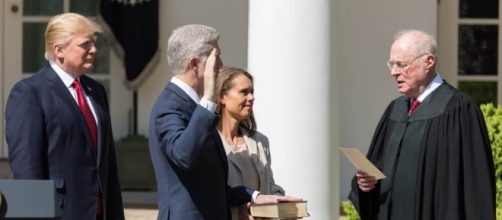Justice Anthony Kennedy is considering Retirement, sources close to him said, amid an annual gathering of Kennedy's former clerks.
Kennedy, a conservative, was appointed to the U.S. Supreme Court in 1988 by President Ronald Reagan, and has cast several tie-breaking votes throughout his career.
Key Rulings
Kennedy cast the tie-breaking vote in Obergefell v. Hodges, which legalized same-sex marriage nationwide in 2015.
"They ask for equal dignity in the eyes of the law and the Constitution grants them that right," Kennedy said.
He upheld the Roe v. Wade ruling of banning abortions in 1992's Casey v.
Planned Parenthood.
"These matters, involving the most intimate and personal choices a person may make in a lifetime, choices central to personal dignity and autonomy, are central to the liberty protected by the Fourteenth Amendment," Kennedy said. "At the heart of liberty is the right to define one's own concept of existence, of meaning of the universe, and of the mystery of human life."
His 2007 ruling in Gonzales v. Carhart upheld the ban on late-term abortions, although he believed that the state had a responsibility to unborn children and believed that some women might regret their decision.
"While we find no reliable data to measure the phenomenon, it seems unexceptionable to conclude some women come to regret their choice to abort the infant life they once created and sustained," Kennedy said.
Just as he wavered on the issue of abortion, Kennedy wavered on affirmative action "when he voted for the first time in favor of a race-conscious admissions plan at a public university," CNN reported.
He was the deciding vote in Citizens United v. FEC, striking down campaign spending limits for corporations.
Kennedy voted against gun control and voting rights, and in favor of then-candidate George W.
Bush in Bush v. Gore, effectively deciding the outcome of the 2000 presidential election.
Replacement
While Kennedy has not officially announced retirement, sources close to him confirm the rumors that he is "seriously considering" it, CNN reported. Kennedy, 80, could step down during President Donald Trump's first term, or wait until after it.
Upon taking office, Trump appointed Justice Neil Gorsuch to replace the late Justice Antonin Scalia. Gorsuch was a former clerk for Kennedy.
Unlike that appointment, which replaced a conservative justice with another conservative justice, replacing Kennedy will impact the balance of the Supreme Court. Kennedy frequently bridged the divide between liberal and conservative justices, and Trump would likely appoint a strong conservative to take his place.


